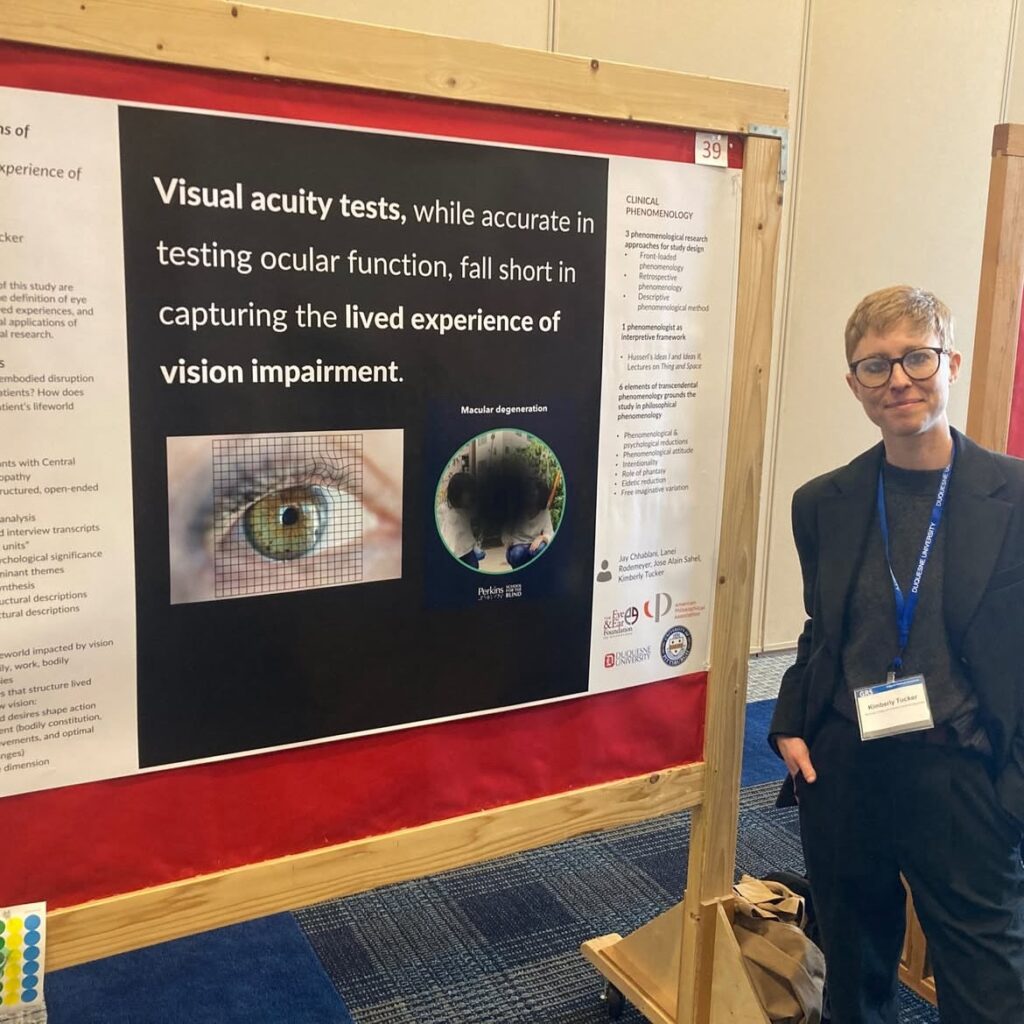Thanks to the support of the Hillman Foundation to the Department of Ophthalmology, a partnership between Duquesne University Department of Philosophy and the University of Pittsburgh Department of Ophthalmology is helping to understand vision loss and improve patient care. It involves the study of phenomenology — a distinctive strength of Duquesne’s Philosophy Department – which focuses on an individual’s lived experiences within the world.
Duquesne philosophy student Kimberly Tucker, PhD, wrote her dissertation on the phenomenology study she conducted with Dr. José-Alain Sahel, MD, Chair, Department of Ophthalmology and Director, UPMC Vision Institute, and Dr. Jay Chhablani, MD, Director, Clinical Research at the UPMC Vision Institute, on CSCR (central serous chorioretinopathy) patients. Her advisor was Dr. Lanei Rodemeyer, PhD, Associate Professor and Director of Graduate Studies at Duquesne. After successfully defending her dissertation in December 2024, she continues her work as a post doc at the UPMC Vision Institute.
Titled, “How Scientists Can Investigate Perception: Phenomenological Foundations for Qualitative Research,” Dr. Tucker’s dissertation summary starts out by saying, “While medicine makes visible symptoms of disease, phenomenology provides a different tool for making illness experience visible.”
In the study, Dr. Tucker explored the “disruptions to habitual embodiment caused by low vision from eye disease,” investigating new phenomena associated with low vision and testing the phenomenological method to achieve phenomenological validity.
One theme that emerged from the study was linked to structures of perception and habitual embodiment, “where the tactile and visual senses are shown to be intimately intertwined…As individuals adapt to changes in sight, they undergo significant kinesthetic shifts, leading to a reconfiguration of their habitual ways of moving through and relating to the world. These transformations also highlight a striving for perceptual harmony, or ‘orthoaesthetic’ balance, as the senses recalibrate to maintain a kind of functional balance.”
“Vision loss also reshapes temporal and relational dynamics within families and broader social contexts,” Dr. Tucker wrote. And “the medical encounter becomes a pivotal site for exploring empathy, where the quality of interpersonal engagement with the physician can either deepen or disrupt the patient’s experience of care.”
One of the most compelling outcomes, Dr. Tucker found, is the identification of potential applications of phenomenology within clinical contexts, particularly in vision rehabilitation. “At present, the assessment of low-vision’s impact on quality of life within rehabilitation settings remains limited, as clinicians often rely on instruments designed to measure visual function. However, low-vision rehabilitation primarily concerns itself with functional vision, rather than visual function,” she wrote.
When asked how this study will change care and treatment at the Vision Institute going forward, Dr. Tucker said, “I think the study will allow us to develop the phenomenological method, which in turn will inform future studies at the VI. In addition, learning more about vision loss from a patient perspective will also open up new avenues for improving patient care because a phenomenological approach has potential to uncover aspects of lived experiences of low vision that were possibly overlooked by traditional approaches.”
Sidney Kabinoff, a current PhD student in the Philosophy Department at Duquesne, is working closely on a research project with Dr. Sahel, writing a dissertation on the topic of embodiment and vision. “The driving theme is that vision is the sensation which continuously deepens our understanding of the body,” Kabinoff said. “This is because vision is a characteristically non-localized sensation. Its thematic sense (colors, shapes, etc.) does not exist anywhere in, on, or throughout my body despite being the case that my vision-sense is mine. The non-localized nature of vision has challenged a long history of philosophy starting with Aristotle…Philosophers, namely phenomenologists, have…wrestled with the question of ‘where’ our vision comes from.”
There are three paths for pursuing that question, along with, “Where is vision received and made thematic?” They involve exploring different understandings of sight and the corresponding conceptualizations of bodies that live through such sight. “Ultimately, what we are doing is thinking about how vision deepens our understanding of embodiment, and how a deeper understanding of embodiment helps us get a better sense of what vision therapy is doing to/for the patient,” Kabinoff said.
“Our overarching goal is to better understand the patient’s experience, such as their expectations, life with a visual condition, and the resulting visual impairment,” said Dr. Sahel. “We aim at developing an integrated approach to care, where the most advanced technologies benefit their vision, while keeping a ‘holistic’ perspective of each individual who seeks our help.”
The collaboration between phenomenology and research at the UPMC Vision Institute was called “very exciting” by Dr. Tucker. “I believe it demonstrates a creative step forward and a truly interdisciplinary approach to vision studies research,” she added.
